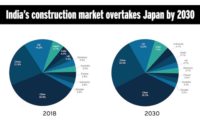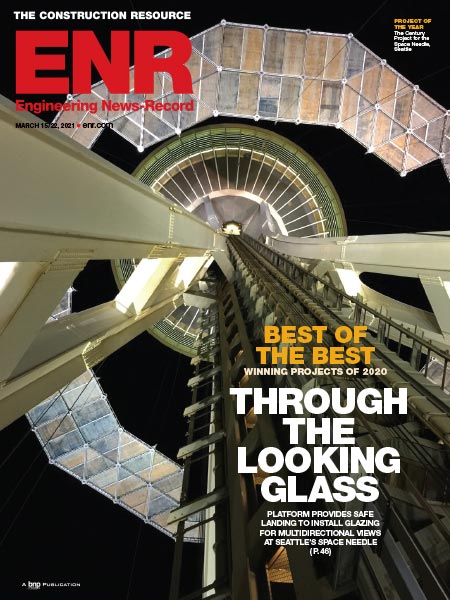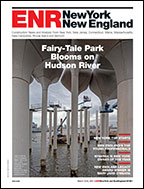India’s Union Budget 2014, presented by the now two-month-old new government’s Finance Minister Arun Jaitley on July 10, brought a new ray of hope to the fledgling infrastructure industry that has been plagued with bureaucratic restraints for the past few years.
The budget has set determined goals, with allocations for 8,500 kilometers of roads, 16 new ports, 100 smart cities and industrial corridors. Given the past inaction, there remains some skepticism on when the projects will be awarded. For example, stalled projects between June 2013 and June 2014 rose by 14%, with 100 projects worth $17 billion scrapped. Of these, 26% of the total investment was a result of land-acquisition issues. A paucity in the supply of raw materials, delays in environmental clearance, unfavorable market conditions and lack of funds were other reasons for the holdups, according to Mumbai-based economic database research company Center for Monitoring Indian Economy Pvt Ltd.
There is a new wave of optimism as the government shows intent to tap foreign direct investment. For the first time, the Prime Minister's Office (PMO) has asked each ministry related to infrastructure to review targets set and reallocate feasible dates for completion. Further, the industry has been asked to submit recommendations for easing out constraints faced by them in implementation; these recommendations are likely to include amendments to the law on land acquisition, renegotiation of public-private-partnership (PPP) contracts and innovative measures for funding, a major hurdle for road projects. In fact, recently, Nitin Gadkari, minister for road transport, highways and shipping, at a Federation for Commerce PPP summit questioned the wisdom of inviting tenders for road-highway projects before the acquisition of land. “Part of the blame must rest with the private sector, which bids in the tendering process in the absence of land and forest clearances,” he said. Gadkari assured, “All gray areas pertaining to road infrastructure projects will be resolved before August 15 this year.”
Already, a new model for highway building under EPC (engineering, procurement and construction) is expected to replace the PPP. Gadkari said financing at low interest rates also is being explored for EPC. Of the 260 projects worth over $17 billion under the PPP model that are currently stalled, a “large percentage have become non-performing assets (NPA) for the banks.” Solutions worth $8 billion “have been discussed.” For building roads, a target has been set at a rate of 30 kilometers per day, only after two years. “Currently, it is difficult to build roads even at a rate of 3 kilometers per day,” added Gadkari. He also announced 300 new road projects, for which detailed project reports will be procured in advance.
Cooperation in urban planning and heritage conservation is being sought from international firms for 100 smart cities and key projects, including the Delhi-Mumbai Industrial Corridor, which will include seven greenfield smart cities between Delhi and Mumbai, along with three smart cities at Dholera, Shendra-Bidkin and Global City to be built by 2019. Modi also has expressed an interest in rejuvenation and private-sector participation in the Indian Railways that will include greenfield sectors, such as at Arunachal Pradesh in northeast India, bordering China.
Large listings of real estate investment trusts are taking off. “It is heartening to see that by allowing measures outside the revenue system—such as real estate investment trusts [REITs], deepening the debt markets and allowing banks to give long-term funding—[it] has raised the expectations of having the best infrastructure in the country,” Ajit Gulabchand, chairman and managing director at Hindustan Construction Co. (HCC), told ENR. Already, Bangalore-based RMZ Offices, with Qatar Investment Authority as a major investor, has said it plans to raise $1.5 billion through a REIT in either Singapore or Mumbai.
There is optimism in the air. Interarch Building Products, for instance, already is seeing business move. “The states of Gujarat, Tamil Nadu and Karnataka are the most proactive, and the industry has laid total trust in the new Modi government for good governance and fast-tracking of projects,” said Sanjay Modi, senior vice president. The company recently was awarded the construction of Honda’s 2500,000-sq-ft facility in Gujarat, close to the Delhi-Mumbai Industrial Corridor, which in five years will become a fertile industrial belt, says Modi.




